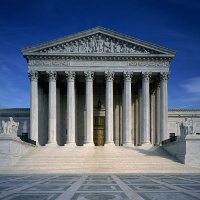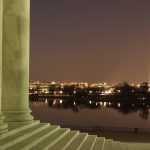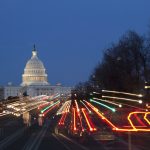 CPIP Founder Adam Mossoff filed an amicus brief today on behalf of 27 law professors in Oil States Energy Services, LLC v. Greene’s Energy Group, LLC, a patent case pending in the Supreme Court. Oil States is challenging the constitutionality of proceedings at the Patent Trial and Appeal Board (PTAB) to determine the validity of an issued patent. Read more
CPIP Founder Adam Mossoff filed an amicus brief today on behalf of 27 law professors in Oil States Energy Services, LLC v. Greene’s Energy Group, LLC, a patent case pending in the Supreme Court. Oil States is challenging the constitutionality of proceedings at the Patent Trial and Appeal Board (PTAB) to determine the validity of an issued patent. Read more
Category: Administrative Agency
The PTAB’s Regulatory Overreach and How it Cripples the Innovation Economy
 On August 14, 2017, the Regulatory Transparency Project of the Federalist Society published a new white paper, Crippling the Innovation Economy: Regulatory Overreach at the Patent Office. This white paper examines how an administrative tribunal created in 2011—the Patent Trial and Appeal Board (PTAB)—has become “a prime example regulatory overreach.” Read more
On August 14, 2017, the Regulatory Transparency Project of the Federalist Society published a new white paper, Crippling the Innovation Economy: Regulatory Overreach at the Patent Office. This white paper examines how an administrative tribunal created in 2011—the Patent Trial and Appeal Board (PTAB)—has become “a prime example regulatory overreach.” Read more
Letter on FCC Set-Top Box Regulation Once Again Confuses the Issue
IP Scholars to FCC: It’s Not About "The Box"
 This past April, we joined other IP scholars in explaining how the FCC’s proposed set-top box rules would undermine the property rights of creators and copyright owners. In reply comments filed last month, the EFF and a group of IP academics argued that the proposed rules would not implicate any copyright owners’ exclusive rights. Read more
This past April, we joined other IP scholars in explaining how the FCC’s proposed set-top box rules would undermine the property rights of creators and copyright owners. In reply comments filed last month, the EFF and a group of IP academics argued that the proposed rules would not implicate any copyright owners’ exclusive rights. Read more
FCC’s Extreme Proposal Threatens the Livelihood of Creators
By Matthew Barblan & Kevin Madigan

Earlier this year, the FCC proposed a new regulatory scheme ostensibly designed to improve the market for pay-TV set-top boxes. Chairman Wheeler claimed that the proposed rules would “tear down the barriers that currently prevent innovators from developing new ways for consumers to access and enjoy their favorite shows and movies on their terms.” Read more
Acknowledging the Limitations of the FTC’s PAE Study
 The FTC’s long-awaited case study of patent assertion entities (PAEs) is expected to be released this spring. Using its subpoena power under Section 6(b) to gather information from a handful of firms, the study promises us a glimpse at their inner workings. Read more
The FTC’s long-awaited case study of patent assertion entities (PAEs) is expected to be released this spring. Using its subpoena power under Section 6(b) to gather information from a handful of firms, the study promises us a glimpse at their inner workings. Read more
A New Librarian of Congress and a New Copyright Office
 With the Senate considering the confirmation of Dr. Carla Hayden as the next Librarian of Congress, I have joined thirteen other intellectual property law professors in an Open Letter suggesting that her confirmation should serve as an important reminder that the U.S. Read more
With the Senate considering the confirmation of Dr. Carla Hayden as the next Librarian of Congress, I have joined thirteen other intellectual property law professors in an Open Letter suggesting that her confirmation should serve as an important reminder that the U.S. Read more
#AliceStorm: When It Rains, It Pours…
The following guest post from Robert R. Sachs, Partner at Fenwick & West LLP, first appeared on the Bilski Blog, and it is reposted here with permission.
By Robert R. Sachs
 Last year I christened the post-Alice impact on patents #Alicestorm, riffing on the hashtag #hellastorm used to refer to the Pineapple Express storms the drenched the Bay Area in December 2014. Read more
Last year I christened the post-Alice impact on patents #Alicestorm, riffing on the hashtag #hellastorm used to refer to the Pineapple Express storms the drenched the Bay Area in December 2014. Read more
Principles and Priorities to Guide Congress’s Ongoing Copyright Review
Last week, CPIP published a new white paper, Copyright Principles and Priorities to Foster a Creative Digital Marketplace, by Sandra Aistars, Mark Schultz, and myself, which draws from the testimonies and scholarly writings of CPIP Senior Scholars in order to guide Congress as it continues its comprehensive review of the Copyright Act. Read more
#AliceStorm for Halloween: Was it a Trick or a Treat?
The following guest post from Robert R. Sachs, Partner at Fenwick & West LLP, first appeared on the Bilski Blog, and it is reposted here with permission.
By Robert R. Sachs
 Alice has been busy the last two months, continuing to haunt the federal courts and the Knox and Randolph buildings at the USPTO. Read more
Alice has been busy the last two months, continuing to haunt the federal courts and the Knox and Randolph buildings at the USPTO. Read more